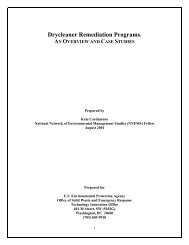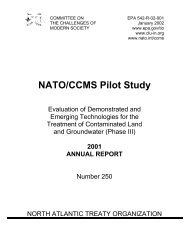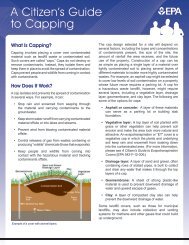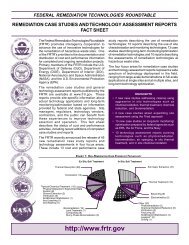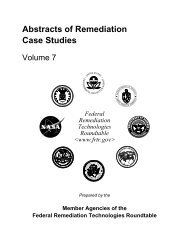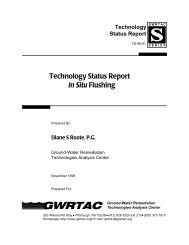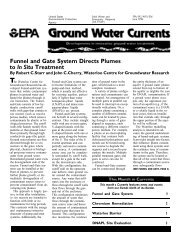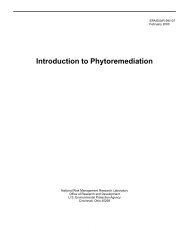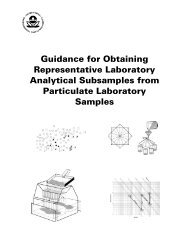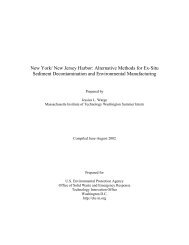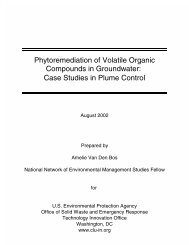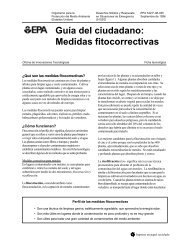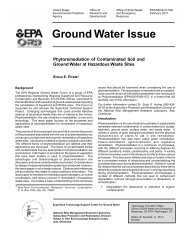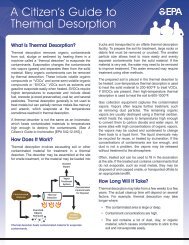NATO/CCMS Pilot Study Evaluation of Demonstrated and ... - CLU-IN
NATO/CCMS Pilot Study Evaluation of Demonstrated and ... - CLU-IN
NATO/CCMS Pilot Study Evaluation of Demonstrated and ... - CLU-IN
Create successful ePaper yourself
Turn your PDF publications into a flip-book with our unique Google optimized e-Paper software.
<strong>NATO</strong>/<strong>CCMS</strong> <strong>Pilot</strong> Project on Contaminated L<strong>and</strong> <strong>and</strong> Groundwater (Phase III) January 2001<br />
<strong>IN</strong>TRODUCTION<br />
The Council <strong>of</strong> the North Atlantic Treaty Organization (<strong>NATO</strong>) established the Committee on the Challenges<br />
<strong>of</strong> Modern Society (<strong>CCMS</strong>) in 1969. <strong>CCMS</strong> was charged with developing meaningful programs to share<br />
information among countries on environmental <strong>and</strong> societal issues that complement other international<br />
endeavors <strong>and</strong> to provide leadership in solving specific problems <strong>of</strong> the human environment. A fundamental<br />
precept <strong>of</strong> <strong>CCMS</strong> involves the transfer <strong>of</strong> technological <strong>and</strong> scientific solutions among nations with similar<br />
environmental challenges.<br />
The management <strong>of</strong> contaminated l<strong>and</strong> <strong>and</strong> groundwater is a universal problem among industrialized countries,<br />
requiring the use <strong>of</strong> existing, emerging, innovative, <strong>and</strong> cost-effective technologies. This document reports on<br />
the second meeting <strong>of</strong> the Phase III <strong>Pilot</strong> <strong>Study</strong> on the <strong>Evaluation</strong> <strong>of</strong> <strong>Demonstrated</strong> <strong>and</strong> Emerging Technologies<br />
for the Treatment <strong>and</strong> Clean Up <strong>of</strong> Contaminated L<strong>and</strong> <strong>and</strong> Groundwater. The United States is the<br />
lead country for the <strong>Pilot</strong> <strong>Study</strong>, <strong>and</strong> Germany <strong>and</strong> The Netherl<strong>and</strong>s are the Co-<strong>Pilot</strong> countries. The first phase<br />
was successfully concluded in 1991, <strong>and</strong> the results were published in three volumes. The second phase, which<br />
exp<strong>and</strong>ed to include newly emerging technologies, was concluded in 1997; final reports documenting 52<br />
completed projects <strong>and</strong> the participation <strong>of</strong> 14 countries were published in June 1998. Through these pilot<br />
studies, critical technical information was made available to participating countries <strong>and</strong> the world community.<br />
The Phase III study focuses on the technologies for treating contaminated l<strong>and</strong> <strong>and</strong> groundwater. This Phase is<br />
addressing issues <strong>of</strong> sustainability, environmental merit, <strong>and</strong> cost-effectiveness, in addition to continued<br />
emphasis on emerging remediation technologies. The objectives <strong>of</strong> the study are to critically evaluate<br />
technologies, promote the appropriate use <strong>of</strong> technologies, use information technology systems to disseminate<br />
the products, <strong>and</strong> to foster innovative thinking in the area <strong>of</strong> contaminated l<strong>and</strong>. The Phase III Mission<br />
Statement is provided at the end <strong>of</strong> this report.<br />
The first meeting <strong>of</strong> the Phase III study was held in Vienna, Austria, on February 23-27, 1998. The<br />
meeting included a special technical session on treatment walls <strong>and</strong> permeable reactive barriers. The<br />
proceedings <strong>of</strong> the meeting <strong>and</strong> <strong>of</strong> the special technical session were published in May 1998. The second<br />
meeting <strong>of</strong> the Phase III <strong>Pilot</strong> <strong>Study</strong> convened in Angers, France, on May 9-14, 1999, with representatives<br />
<strong>of</strong> 18 countries attending. A special technical session on monitored natural attenuation was held.<br />
This report <strong>and</strong> the general proceedings <strong>of</strong> the 1999 annual meeting were published in October 1999. This<br />
third meeting was held in Wiesbaden, Germany from June 26-30, 2000. The special technical session<br />
focused on decision support tools.<br />
This <strong>and</strong> many <strong>of</strong> the <strong>Pilot</strong> <strong>Study</strong> reports are available online at http://www.nato.int/ccms/ <strong>and</strong><br />
http://www.clu-in.org/intup.htm. General information on the <strong>NATO</strong>/<strong>CCMS</strong> <strong>Pilot</strong> <strong>Study</strong> may be obtained<br />
from the country representatives listed at the end <strong>of</strong> the report. Further information on the presentations in<br />
this decision support tools report should be obtained from the individual authors.<br />
1<br />
Stephen C. James<br />
Walter W. Kovalick, Jr., Ph.D.<br />
Co-Directors



